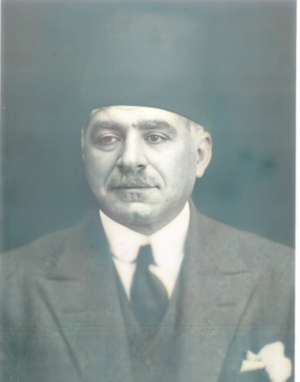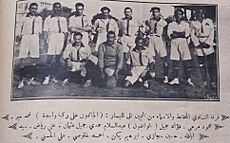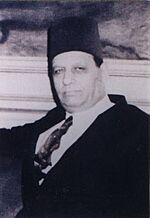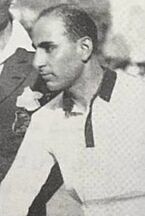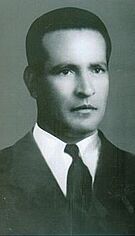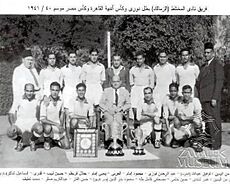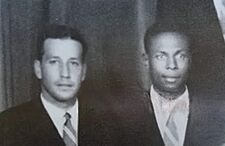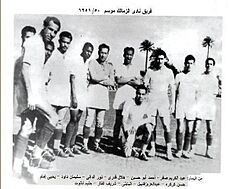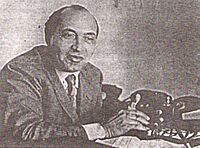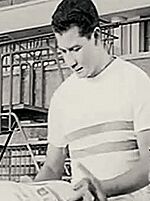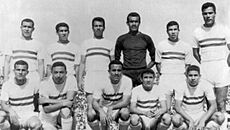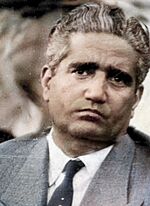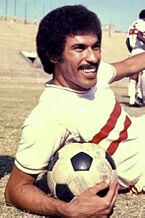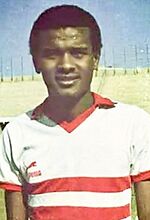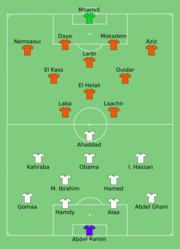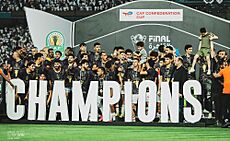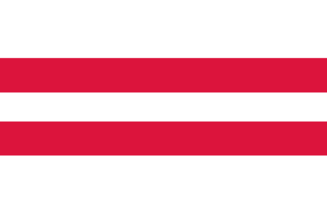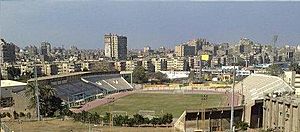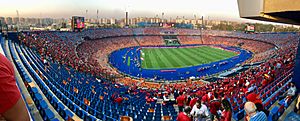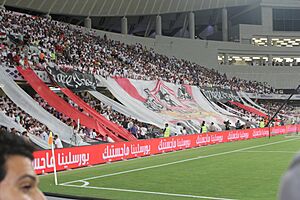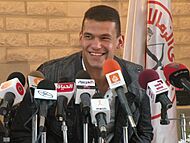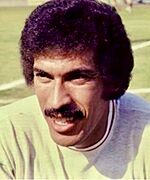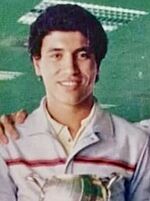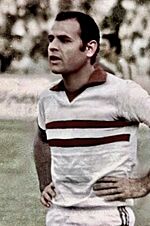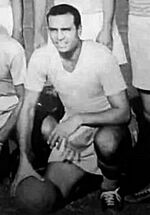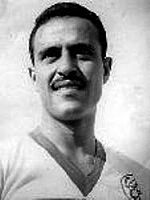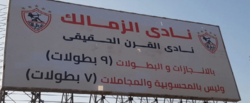Zamalek SC facts for kids
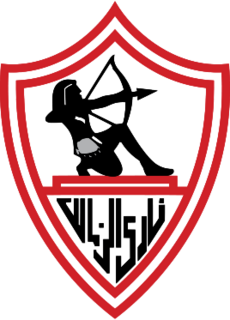 |
|||
| Full name | Zamalek Sporting Club | ||
|---|---|---|---|
| Nickname(s) | مدرسة الفن والهندسة (School of Art and Engineering) النادي الملكي (The Royal Club) القلعة البيضاء (The White Castle) الفارس الأبيض (The White Knight) قاهر الأجانب (Conqueror of the Foreigners) نادي الوطنية والكرامة (Club of Patriotism and Dignity) |
||
| Short name | ZSC, ZAM | ||
| Founded | 5 January 1911 | ||
| Ground |
|
||
| Capacity | 75,000 | ||
| Chairman | Hussein Labib | ||
| Head Coach | Yannick Ferrera | ||
| League | Egyptian Premier League | ||
| 2024–25 | Egyptian Premier League, 3rd of 18 | ||
|
|
|||
Zamalek Sporting Club (Arabic: نادي الزمالك للألعاب الرياضية), often called Zamalek, is a famous Egyptian sports club from Cairo, Egypt. It's best known for its professional men's football team. This team plays in the Egyptian Premier League, which is the top football league in Egypt. Zamalek is known for winning many titles in Egypt and across Africa. They often compete in big tournaments organized by the CAF.
The club started on January 5, 1911. It was first called Cairo International Sports Club. Since the beginning, their home uniform has been white. They won their first championship in 1913. Zamalek is one of the most popular clubs in Africa and the Middle East. It was the only Egyptian club to join the Sultan Hussein Cup as a way to show Egyptian strength against the British presence. They reached the final in 1917, which encouraged other Egyptian clubs to join. In 1941, the club was honored by King Farouk I and was officially named Farouk El Awal Club. However, "Zamalek" was its unofficial name since the 1910s and became official after the 1952 Egyptian revolution.
Zamalek became a strong team in Egyptian football in the 1920s. They were the first Egyptian team to win a title. They won the Sultan Hussein Cup in 1921 and the Egypt Cup in 1922. They also won the Cairo League in 1922–23. In Egypt, Zamalek has won 14 Egyptian Premier League titles, 29 Egypt Cup titles, and 4 Egyptian Super Cup titles. They also won 14 Cairo League titles and 2 Sultan Hussein Cup titles. They are one of only two clubs that have played in every season of the Egyptian Premier League. They have never been moved down to a lower league.
Internationally, Zamalek is considered the most successful African football club of the 20th century. They won 9 titles, more than any other African club in that period. They have won five CAF Champions League titles, two CAF Confederation Cup titles, five CAF Super Cup titles, and one African Cup Winners' Cup title. They were the first Egyptian team to win the CAF Super Cup in 1994. Zamalek is also known as the Club of the Afro-Asian Century. They were the first Egyptian team to win the Afro-Asian Club Championship in 1987 and won it again in 1997. Zamalek was also the first Egyptian team to qualify for the FIFA Club World Cup in 2000, though the tournament was later canceled.
Contents
Club History
Early Days (1911–1915)
The idea for Zamalek Sporting Club started around 1911. The club was first called Cairo International Sports Club. Early records show that Ahmed Zaki Pasha, an important Egyptian official, was on the club's board. The club was interested in things like car races.
In 1912, the club started a monthly magazine called Les Sports. They also launched a weekly newspaper called Cairo Sports. Zamalek (C.I.S.C) joined the International Union's championships. In 1913, they won the Bolanchi Challenge Cup by beating a Greek team 6–0. This match was played at Zamalek's stadium in Bulaq.
Becoming Egyptian and Early Wins (1915–1941)
In 1915, Ibrahim Allam "Juhainah" and his football team joined Zamalek. Zamalek was the first Egyptian team to play against foreign teams. In 1916, they beat the Scottish Horse team 1–0. In 1917, Zamalek was the first and only Egyptian club to play in the Sultan Hussein Cup, Egypt's first official football competition. They reached the final against an English team. This encouraged many other Egyptian clubs to join the competition later.
In 1917, Ibrahim Allam and other Egyptian members worked to make the club more Egyptian. They wanted to remove foreign members from the club's leadership. After some struggles, a new Egyptian board was elected. Mohammad Badr became the first Egyptian president.
In 1921, Zamalek won the Sultan Hussein Cup, becoming the first Egyptian team to win a major title. They beat Britain's Sherwood Foresters 2–1 in the final. The goals were scored by El-Sayed Abaza and Hussein Hegazi.
In 1922, Zamalek won the first Egypt Cup. Two weeks later, they won the Sultan Hussein Cup again. The Cairo League also started in 1922, and Zamalek won its first title in 1922–23. Famous players like Hussein Hegazi, Ali Riadh, and El-Sayed Abaza helped the team win many titles in the 1920s. In 1923, Zamalek beat Al Ahly 5–0 in a friendly match. Sadek Fahmy scored three goals, which is called a hat-trick.
Mohammed Haidar Pasha became the fourth president of Zamalek in 1923. He was the longest-serving president in the club's history, leading it for almost 30 years. He was also a Minister of War and the Commander-in-Chief of the Egyptian Army. He helped make Zamalek a very important club in Egypt.
Around 1924, Zamalek moved to a new location near the River Nile. The club earned the nickname "Qahir-al-Aganib" (the conqueror of foreigners). This was because they often beat strong foreign teams in friendly and official matches. This made the club and football more popular in Egypt. In 1925, Zamalek won the King Fouad Cup for the first time.
In 1928, Hussein Hegazi looked for new players from schools to join Zamalek. This helped create the club's famous chant, "Oh Zamalek, oh, school of play, art, and engineering." This chant became popular after 1952 when new stands were built at the stadium.
Zamalek won the Cairo League two times in a row in 1928–29 and 1929–30. Players like Mohamed Latif and Mostafa Taha were key to these wins. In 1929, Zamalek even beat the Hungary national football team 2–1 in a friendly game.
Mostafa Taha became a star player in the 1930s. He scored many goals and is Zamalek's top scorer in the Cairo derby with 12 goals. He scored over 100 goals for the team. Zamalek won several titles in the 1930s, including the 1931–32 Egypt Cup by beating Al Ahly 2–1.
After Hussein Hegazi retired in 1931, new players like Abdulrahman Fawzi and Mohamed Latif helped Zamalek win more titles. They won the Cairo League twice and the King Fouad Cup in 1934. Zamalek continued to win the Egypt Cup, beating Al Ahly 3–0 in the 1935 final.
Ruling Egypt's Football (1941–1952)
The 1940s were a great time for Zamalek. They won many football tournaments in Egypt. The club was also growing as a social and educational place. Zamalek won the Cairo League in 1939–40 and 1940–41. They also won the King Fouad Cup in 1940. With Mohamed Latif as captain and Tewfik Abdullah as coach, the team was very strong.
In 1941, King Farouk I, who was a Zamalek fan, gave his royal support to the club. The club's name was changed to Nady Farouk El Awal (Farouk I Club). King Farouk became the club's honorary president.
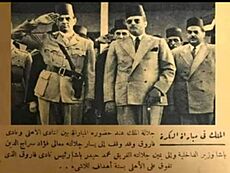
In 1944, Mohammed Haidar Pasha convinced King Farouk to watch the Egypt Cup final. Zamalek beat Al Ahly 6–0 and won the cup. This 6–0 win is the biggest victory in the history of the Cairo derby and has not been broken. Zamalek also had another 6–0 win against Al Ahly in the 1942 Cairo League.
Many talented players emerged in this period, like Yehia Emam, Hanafy Bastan, and Abdel-Karim Sakr. Zamalek won the Cairo League five times in the 1940s. The club's strong leadership under Mohammad Haider Pasha helped them succeed.
Abdel-Karim Sakr joined Zamalek in 1939 and played for 14 seasons, scoring over 100 goals. He helped the team win many titles and derby matches. He is the only player to score in both 6–0 wins against Al Ahly.
In 1948, the new Egyptian League started. Zamalek played the first match on October 22, winning 5–1 against Al Masry. Mohamed Amin scored the first goal in the league's history, and Saad Rustom scored the first hat-trick. In the early 1950s, Zamalek won the Cairo League three times in a row. In the 1952 Egypt Cup final, Zamalek beat Al Ahly 2–0 to win their 8th cup title.
After the 1952 Revolution (1952–1960)
After the 1952 revolution, on August 18, 1952, the club's name officially changed to Zamalek. This name comes from the area where the club is located, Zamalek Nile Island. The word "Zamalek" means "Preciously owned" in Egyptian slang. The club moved to a new, larger area of 35 acres.
Essam Baheeg was a very important player for Zamalek in the 1950s. He was discovered by Mohammed Haidar Pasha and joined the youth team at 18. Baheeg was known for his loyalty to Zamalek and played his entire 12-year career with the club. He also helped the Egypt national football team win the Africa Cup of Nations in 1959. After retiring, he coached Zamalek and won four titles.
This era saw new loyal and talented players like Alaa El-Hamouly and Sharif El-Far. Alaa El-Hamouly is Zamalek's top scorer in the Egypt Cup with 23 goals.
Zamalek won the Egypt Cup six times between 1952 and 1960. They also won the Cairo League three times in a row from 1950–51 to 1952–53.
Continued Success (1960–1984)
The 1960s brought a new group of talented players like Hamada Emam and Ahmed Rifaat. In 1961, Zamalek invited Real Madrid to play a friendly match in Cairo to celebrate the club's 50th anniversary.
In 1966, Zamalek played against West Ham United F.C., who were European champions. Zamalek won the match 5–1, with Hamada Emam scoring three goals. This was a huge win against a top European team.
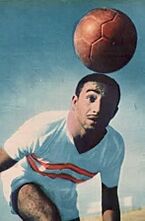
After the 1967 war, Zamalek helped other clubs by hosting them at its grounds. Helmy Zamora became president in 1967. He was the first Egyptian sportsman to lead a club. He helped build many of the club's facilities and refused any payment for his work. The club's old stadium is now named after him.
The 1970s team was one of Zamalek's best, with legendary players like Taha Basry, Hassan Shehata, and Farouk Gaafar. In 1975, Zamalek won the 1975 Egypt Cup final. Hassan Shehata scored the winning goal. Shehata was a fantastic player, known for his dribbling skills. He was the Egyptian League's top scorer twice and scored 108 goals for Zamalek. He later coached the Egypt national team to win three African Cup of Nations titles.
Zamalek continued to be known as "Qahir-al-Aganib." In 1977, they beat Bayern Munich 3–2 in a friendly match. Players like Ali Khalil were also stars. Khalil scored 94 goals for Zamalek and was known for his honesty. In one match, he told the referee that his goal should not count because the ball went through a torn net.
Farouk Gaafar, nicknamed the "King of Midfield," was another key player. He was the first captain to lift the African Cup of Champions Clubs trophy for Zamalek in 1984.
Zamalek won the Egypt Cup two more times in the 1970s. They also won the Egyptian Premier League in 1963–64, 1964–65, 1977–78, and 1983–84. They won the October League Cup in 1974, which was held when the main league was canceled due to the 1973 war.
African Triumphs (1984–2005)
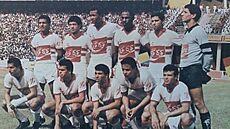
Zamalek won its first African title in 1984, beating Nigeria's Shooting Stars. In 1986, they won their second 1986 African Cup of Champions Clubs title. In 1987, Zamalek won the Afro-Asian Club Championship against Japan's Furukawa Electric. This was the first time an Egyptian club won this title.
In the 1987–88 season, Zamalek won the Egyptian League with Essam Baheeg as coach. Gamal Abdel-Hamid was the top scorer that season. He scored over 90 goals for Zamalek and was Egypt's captain in the 1990 FIFA World Cup.
In 1993, Zamalek won the 1993 African Cup of Champions Clubs final against Ghana's Asante Kotoko. Then, in 1994, they won the 1994 CAF Super Cup by beating their rival, Al Ahly. This match was called the "African Game of the 20th Century."
In 1996, Zamalek won their 4th CAF Champions League title, followed by the 1997 CAF Super Cup. In the same year, Zamalek won the 1997 Afro-Asian Club Championship again, becoming the only team to win it twice.
Kamal Darwish was Zamalek's president from 1996 to 2005. During his time, Zamalek won 16 football titles. In 2003, Zamalek was named the best club in the world by the IFFHS. They were also the first Egyptian team to qualify for the 2001 FIFA Club World Cup, though it was canceled.
Zamalek won the CAF Champions League in 2002 and the CAF Super Cup in 2003. They also won the first two Egyptian Super Cup championships in 2001 and 2002. Zamalek won seven championships between the 2002–03 and 2003–04 seasons. They won the Egyptian Premier League three times in 2000–01, 2002–03, and 2003–04. They also won the Egypt Cup in 1999 and 2002. Hazem Emam was a key player during this time, winning 14 titles with Zamalek.
Challenges and Comeback (2005–Present)
From 2005 to 2013, Zamalek faced some challenges with changes in club leadership. The football team won only two titles during this period: the Egypt Cup in 2007–08 and 2012–13. Shikabala, a talented winger, was a very important player who kept Zamalek popular during these tough times. He is now the most decorated player in the club's history.
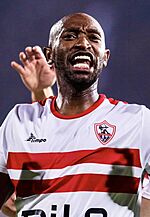
Many Zamalek players, including Shikabala, Amr Zaki, and Mohamed Abdel Shafy, were part of the Egypt national football team that won the Africa Cup of Nations three times in a row (2006, 2008, and 2010).
In 2014, Mortada Mansour became the club president. Zamalek won the 2014 Egypt Cup. In the 2014–15 season, Zamalek won the Egyptian Premier League and set a record for most points. They also won the 2015 Egypt Cup by beating Al Ahly 2–0.
In 2016, Zamalek reached the CAF Champions League final and won the 2016 Egypt Cup again against Al Ahly. In 2018, they won the 2018 Egypt Cup.
In 2019, Zamalek won the CAF Confederation Cup, the 2019 Egypt Cup, the Saudi-Egyptian Super Cup, the 2020 Egyptian Super Cup, and the 2020 CAF Super Cup. Since 2014, the football team has won 11 championships.
In November 2020, the Ministry of Youth and Sports suspended Zamalek's board. New committees were appointed to manage the club. In the 2020–21 season, Zamalek won the Egyptian Premier League after six years. They also won the Egypt Cup that year.
In November 2021, Mortada Mansour and his board returned to lead the club. In the 2021–22 season, the team won the Egyptian League for the second year in a row and the Egypt Cup.
In October 2023, Hussein Labib and his team won the club elections, starting a new era for Zamalek. Zamalek SC defeated RS Berkane to win the 2023–24 CAF Confederation Cup title for the second time. This brought their total continental titles to 14. Zamalek also won the 2024 CAF Super Cup, their fifth Super Cup title, by beating Al Ahly in a penalty shootout. This match is known as the "African Super of the 21st Century."
Club Identity
Crests
In 1913, the club's official name was Cairo International Sports Club (C.I.S.C). In 1941, when the club was renamed "Farouk Club," the royal emblem of the Kingdom of Egypt and Sudan became its official logo.
| The Evolution of the Crest of Zamalek SC | ||||||||
|---|---|---|---|---|---|---|---|---|
| 1913–1941 | 1941–1952 | Since 1952 | ||||||
 |
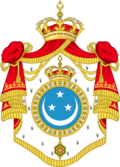 |
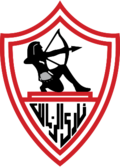 |
||||||
After the 1952 revolution, the club's name and logo changed. The current logo mixes sports with ancient Egyptian history. The main colors, white and red, represent peace and struggle. The arrow in the upper part of the logo points to a target, showing the club's goals.
Colors
Zamalek has always used white and red as its main colors. Their home jersey is usually all white with two parallel red lines across the chest.
Kit Suppliers and Sponsors
Zamalek has had many different companies make their uniforms and sponsor their shirts over the years. Some well-known brands include Hummel, Puma, Adidas, and Nike. Sponsors have included Renault, Coca-Cola, Philips, KFC, and Nile Developments.
| Period | Kit manufacturer | Shirt sponsor |
|---|---|---|
| 1979–1980 | Hummel | None |
| 1980–1981 | Renault | |
| 1981–1982 | Puma | None |
| 1982–1984 | Sport Cola | |
| 1984–1985 | Coca Cola | |
| 1985–1986 | Umbro | None |
| 1986–1989 | Adidas | Fanta |
| 1992–1996 | Venecia | Olympic Electric |
| 1999–2001 | Diadora | Philips |
| 2001–2004 | Adidas | Chipsey |
| 2004–2005 | Venecia | None |
| 2005–2007 | Adidas | SIPES |
| 2007–2008 | Venecia | KFC |
| 2008–2011 | Adidas | Ceramica Royal |
| 2011–2012 | York | |
| 2012–2013 | Prego | |
| 2013–2014 | Twist | |
| 2014–2015 | SAIB Bank | |
| 2015–2016 | Macron | |
| 2016–2018 | Joma | TE |
| 2018–2019 | Puma | |
| 2019–2021 | SAIB Bank | |
| 2021–2024 | Tempo | Nile Developments |
| 2024 - 2025 | ZAT | |
| 2025 - Present | Nike | Nile Developments |
Kit Evolution
|
|
|
|
|
|
|
|
|
|
|
|
|
|
|
|
|
|
|
Source:
Stadiums
Helmy Zamora Stadium
Helmy Zamora Stadium was once Zamalek's main home stadium. It was officially opened in 1959. The stadium was later named after Helmy Zamora, a club legend. Today, it is mainly used for team training and friendly matches. It was renamed Helmy Zamora Stadium in October 2023.
Cairo International Stadium
The Cairo International Stadium is Zamalek's main stadium for official matches. The Helmy Zamora Stadium is not big enough for official games. So, Zamalek plays its home league and African matches at Cairo International Stadium.
Supporters
Zamalek has a group of dedicated fans called the Ultras White Knights. They were formed in 2007 and are known for their exciting displays.
Stadium Incidents
- Helmy Zamora Stadium Incident 1974: In 1974, 48 people died in a crowd crush at a friendly game at Helmy Zamora Stadium.
- 30 June Stadium Incident 2015: On February 8, 2015, 20 supporters died in clashes outside the 30 June Stadium.
Club Records and Statistics
Most Appearances
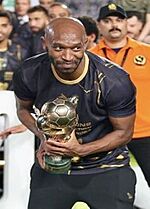
| Rank | Name | Years | League | Cup | Super Cup | African | Arab | Total |
|---|---|---|---|---|---|---|---|---|
| 1 | 1997–2014 | 345 | 40 | 4 | 88 | 27 | 504 (0) | |
| 2 | 2002–2005 2006–2014 2016–2017 2019–2025 |
270 | 48 | 5 | 69 | 10 | 402 (70) | |
| 3 | 1999–2009 | 219 | 27 | 3 | 58 | 32 | 339 (138) | |
| 4 | 1995–2008 | 207 | 23 | 2 | 56 | 35 | 323 (26) | |
| 5 | 1999–2009 | 144 | 27 | 3 | 51 | 31 | 248 (11) | |
| 6 | 1997–2004 2007–2008 |
146 | 21 | 2 | 42 | 22 | 223 (11) | |
| 7 | 1999–2004 2005–2007 |
126 | 31 | 3 | 38 | 3 | 231 (8) | |
| 8 | 2000–2009 2007–2008 |
145 | 17 | 1 | 33 | 33 | 229 (74) | |
| 9 | 2008–2016 2017–2022 |
151 | 18 | 0 | 54 | 4 | 227 (10) | |
| 10 | 2008–2016 2007–2014 |
145 | 12 | 0 | 47 | 0 | 204 (50) |
Top Goal-Scorers
| Rank | Player | Time | League | Cup | October League Cup | Confederation | African | Afro-Asian | Arab | Total |
|---|---|---|---|---|---|---|---|---|---|---|
| 1 | 1999-2009 | 80 (210) | 18 (27) | 0 (3) | 0 | 23 (58) | 0 | 23 (13) | 134 (330) | |
| 2 | 1966-1968
1973-1982 |
77 | 10 | 9 | 0 | 6 | 0 | 0 | 102 | |
| 3 | 1984-1994 | 73 | 7 | 0 | 0 | 16 | 1 | 0 | 97 | |
| 4 | 1970-1980 | 78 | 12 | 1 | 0 | 3 | 0 | 0 | 94 | |
| 5 | 1949-1962 | 68 | 23 | 0 | 0 | 0 | 0 | 0 | 91 | |
| 6 | 2019-2025 | 61 (164) | 8 (16) | 0 | 0 | 14 (17) | 0 | 1 (3) | 86 | |
| 7 | 1957-1974 | 74 | 10 | 0 | 0 | 0 | 0 | 0 | 84 | |
| 8 | 2000-2009 | 46 (145) | 10 (17) | 0 | 0 | 10 (33) | 0 | 8 (33) | 74 (229) | |
| 9 | 1981-1992 | 51 | 6 | 0 | 4 | 10 | 0 | 0 | 71 | |
| 10 | 2002–2005 2006–2014 2016–2017 2019–2025 |
50 (276) | 10 (48) | 0 | 0 | 10 (69) | 0 | 0 | 70 (394) |
- Most goals scored in all competitions: 134 – Abdel Halim Ali
- Most goals scored in the League: 80 – Abdel Halim Ali
- Most goals scored in October League Cup: 9 – Hassan Shehata
- Most goals scored in Egypt Cup: 23 – Alaa El-Hamouly
- Most goals scored in all African competitions: 23 – Abdel Halim Ali
- Most goals scored in all Arabian competitions: 13 – Abdel Halim Ali
Awards for Players
Several Zamalek players have won the EFA Egyptian Player of the Year award:
 Hassan Shehata – 1976
Hassan Shehata – 1976 Ibrahim Youssef – 1984
Ibrahim Youssef – 1984 Tarek El-Said – 2001
Tarek El-Said – 2001 Hazem Emam – 2003
Hazem Emam – 2003 Shikabala – 2011
Shikabala – 2011
Team Records
- Longest Winning Streak: 10 matches (1987–1988), (2012–2013).
- Longest Clean Sheet (no goals conceded): 7 matches (2014–15 Egyptian Premier League).
- Longest Unbeaten Streak in Egypt Cup (Egyptian Record): 22 matches (2013–2017).
- Longest Unbeaten Home Streak in African Cups (African Record): 70 matches (1976–2005).
Individual Player Records
- Ayman Younes scored the fastest goal in the league in 1990, after only 13 seconds.
- Mohamed Amin scored Zamalek's first goal in the Egyptian League.
- Saad Rostom scored Zamalek's first hat-trick in the league.
The following players from Zamalek have been the top scorers in the league:
| Season | Player | Goals |
|---|---|---|
| 1960–61 | 16 | |
| 1976–77 | 17 | |
| 1978–79 | 12 | |
| 1979–80 | 14 | |
| 1987–88 | 11 | |
| 1997–98 | 15 | |
| 2000–01 | 13 | |
| 2001–02 | 18 | |
| 2003–04 | 21 | |
| 2010–11 | 13 | |
| 2021–22 | 19 |
Rivalries
Cairo Derby
The Cairo Derby is a very important football match between Zamalek and Al Ahly SC. Both clubs are from Greater Cairo. Their games are a big highlight of the football season and are watched by many people in the Middle East and North Africa. They usually play twice a season in the Egyptian Premier League, and sometimes in the Egypt Cup final or the CAF Champions League.
Mit Okba Derby
The Mit Okba derby is a football match between Zamalek and Tersana SC. Both teams are from the Mit Okba area in Giza. This derby used to be very important in the 1960s and 1970s. However, Tersana SC's performance has declined, and they have been moved to a lower league several times.
Finances and Ownership
Zamalek has various financial agreements and sponsorships. In 2018, a sponsorship contract increased to 120 million Egyptian pounds per year. The club also has agreements with banks and other companies. These deals help fund the club's activities and development.
Club of the Century
In February 2014, Zamalek announced itself as the "Club of the Century." This is because they were the most successful African club in the 20th century. They won 9 major titles, more than any other club in Africa during that time.
Top African Clubs by Titles (End of 20th Century)
| Pos | Club | Titles | Trophies won |
|---|---|---|---|
|
|
|
4 African Cup of Champions Clubs, 1 CAF Cup Winners' Cup, 2 CAF Super Cup, (2 Afro-Asian Club Championship) | |
|
|
|
2 African Cup of Champions Clubs, 4 CAF Cup Winners' Cups, (1 Afro-Asian Club Championship) | |
|
|
|
1 African Cup of Champions Clubs; 1 CAF Cup Winners' Cup, 1 CAF Cup, 1 CAF Super Cup, (1 Afro-Asian Club Championship) | |
|
|
3 African Cup of Champions Clubs, 1 CAF Super Cup, (1 Afro-Asian Club Championship) | ||
|
|
2 African Cup of Champions Clubs, 1 CAF Cup Winners' Cup, 1 CAF Cup, (1 African Super Cup) | ||
|
|
3 African Cup of Champions Clubs, 1 CAF Cup Winners' Cup |
Honours
Zamalek is one of the top clubs in the world for winning many titles. They have 15 continental (African) and international titles, making them one of the most successful clubs in Africa.
| Type | Competition | Titles | Seasons |
|---|---|---|---|
| Domestic | Egyptian Premier League | 14 | 1959–60, 1963–64, 1964–65, 1977–78, 1983–84, 1987–88, 1991–92, 1992–93, 2000–01, 2002–03, 2003–04, 2014–15, 2020–21, 2021–22 |
| Egypt Cup | 29 | 1921–22, 1931–32, 1934–35, 1937–38, 1940–41, 1942–43, 1943–44, 1951–52, 1954–55, 1956–57, 1957–58, 1958–59, 1959–60, 1961–62, 1974–75, 1976–77, 1978–79, 1987–88, 1998–99, 2001–02, 2007–08, 2012–13, 2013–14, 2014–15, 2015–16, 2017–18, 2018–19, 2020–21, 2024–25 | |
| Egyptian Super Cup | 4 | 2001–02, 2002–03, 2016–17, 2019–20 | |
| Cairo League | 14 | 1922–23, 1928-29, 1929–30, 1931–32, 1933–34, 1939–40, 1940–41, 1943–44, 1944–45, 1946–47, 1948–49, 1950–51, 1951–52, 1952–53 | |
| Sultan Hussein Cup | 2 | 1920–21, 1921–22 | |
| October League | 1 | 1974 | |
| Egyptian Friendship Cup | 1 | 1986 | |
| Egyptian Confederation Cup | 1S | 1995 | |
| Continental | CAF Champions League | 5 | 1984, 1986, 1993, 1996, 2002 |
| African Cup Winners' Cup | 1 | 2000 | |
| CAF Confederation Cup | 2 | 2018–19, 2023–24 | |
| CAF Super Cup | 5 | 1994, 1997, 2003, 2020, 2024 | |
| Intercontinental | Afro-Asian Cup | 2 | 1987, 1997 |
| Regional | Arab Club Championship | 1 | 2003 |
- record
- S shared record
Players
Current Squad
|
|
Players on Loan
|
|
Youth and Reserve Team Players
|
|
Players Under Contract
|
Famous Players
This list includes players who played in at least 100 league games or became international stars.
|
|
|
Source:
Club Personnel
Current Technical Staff
Football Management Team
Medical Staff
| Position | Name |
|---|---|
| Team Doctor | |
| Physiotherapist Specialist | |
| Rehabilitation Specialist |
|
| Masseur |
Club Leadership
- Source: [1]
Other Sports
Zamalek is not just about football! The club also has teams in many other sports. These include Handball, Athletics, Volleyball, and Basketball. Zamalek has won many titles in these sports too, both in Egypt and across Africa. They have also competed in world championships.
See also
 In Spanish: Zamalek Sporting Club para niños
In Spanish: Zamalek Sporting Club para niños
 | William L. Dawson |
 | W. E. B. Du Bois |
 | Harry Belafonte |


